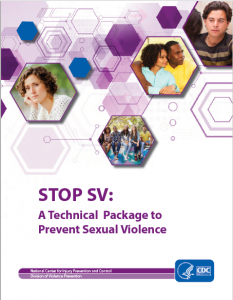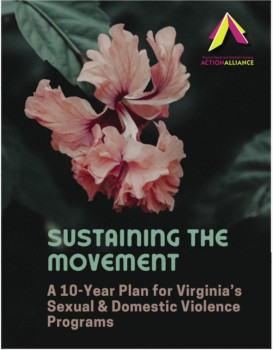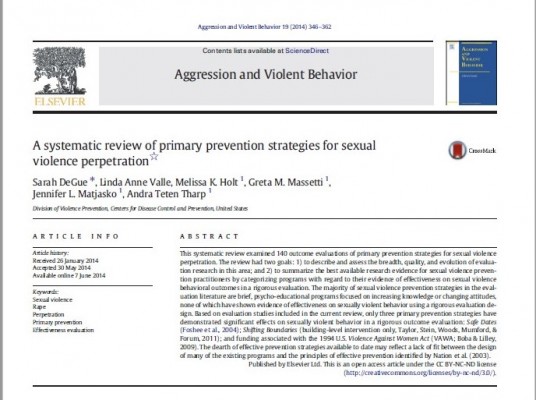Resources Library: Model Policies & Best Practices
Start a Search:
State Policy Playbook for Ending Campus Sexual Assault
Know Your IX's State Policy Playbook outlines key reforms that students, advocates, and state policymakers can pursue to support survivors on campus, keep students safe, and end gender-based violence in school. Although Title IX and the Clery Act require schools to take action to address gender-based violence, these federal laws set only a floor for schools' responsibilities to create safe and equitable learning environments. States can and should do more to keep schools from sweeping sexual violence under the rug.
For additional resources, you can visit the Know your IX website here.
STOP SV: A Technical Package to Prevent Sexual Violence

This Centers for Disease Control and Prevention technical package represents a select group of strategies based on the best available evidencde to help communities and states sharpen their focus on prevention activities with the greatest potential to reduce sexual violenced and its consequences. Each strategy includes a rationale, specific approaches, potential outcomes, and evidence.
Supporting Survivors of Abuse with Disabilities
Here are five modules designed for domestic violence and sexual assault service providers to learn how they can enhance their services for people with disabilities. CEU's are available.
These modules were created by the I-CAN! Accessibility Project. The I-CAN! Accessibility Project is a collaboration between the Virginia Commonwealth University School of Social Work and the Partnership for People with Disabilities.
Visit https://sites.google.com/vcu.edu/abusesurvivorswithdisabilities/home to access these resources.
Sustaining the Movement: A 10-Year Plan for Virginia’s Sexual and Domestic Violence Programs

In August 2021, during the second summer of the COVID-19 pandemic, a diverse group of Sexual and Domestic Violence Agency (SDVA) Directors convened to begin discussing the significant and ongoing funding and sustainability challenges faced by Virginia’s 70+ crisis response agencies. The Sustainability Planning Alliance (SPA) was formed, consisting of six Executive Directors and Action Alliance leadership. They met 1-2times a month for the next 18 months. The group represented diverse regions and perspectives across Virginia – including Hampton, Arlington, Fairfax, White Stone, Charlottesville, Harrisonburg, Richmond, and Radford – with public and non-profit organizations represented, dual sexual and domestic violence and single-issue agencies, Black, Brown and White agency leaders, urban, rural, and suburban service areas, and collectively, more than 100 years of direct experience in Virginia’s movement to end sexual and domestic violence. Based on these ongoing discussions and rigorous data gathering, the SPA offers the following 10-Year Movement Sustainability Plan and recommendations to the field.
RECOMENDATIONS FOR THE FIELD
- For Sexual and Domestic Violence Agencies (SDVAs) and Advocates
- - Build a strong diversified financial foundation for the work.
-
- Create robust administrative and operational capacity that supports growth, sustains current programs and staff, and is nimble in the face of programmatic and administrative challenges.
- For Funders and State Partners
- - Build active, reciprocal, and power-sharing partnerships with SDVAs.
-
- Engage with SDVAs to build a strong infrastructure for the field that can access and manage diverse resources and support well-resourced staff.
- For Legislatorsand Policy Leaders
- - Increase state and federal investments in community safety and sexual and domestic violence prevention.
-
- Advocate for the sustainability and growth of Virginia’s local SDVAs.
- For the Virginia State Coalition (Action Alliance)
- - Provide ongoing and robust training, technical assistance, and support to SDVAs to advance local sustainability strategies.
- - Create a unified mission, vision and values for the work of the SV/DV field while supporting agency autonomy, highlighting SDVAs and their value and impact, and providing forums and venues for people in the field to gather and share with people in similar roles and across identities.
This plan is not a mandate, rather it is a set of strategies, grounded in shared values and collective expertise gathered from advocates and directors across Virginia’s movement to end sexual and domestic violence. It is intended to act as a blueprint towards movement sustainability. Our vision is that these recommendations will become a reality and that at the local, state, and federal level, we will move in alignment towards a future in which every sexual and domestic violence agency throughout the Commonwealth is thriving and able to effectively meet the full needs of survivors, families, and their communities.
Download the plan using the link below.
Systematic Review of Primary Prevention Strategies for Sexual Violence Perpetration

This systematic review from 2014 had two goals related to looking at primary prevention strategies for sexual violence: 1) to describe and assess the breadth, quality, and evolution of evaluation
research in this area; and 2) to summarize the best available research evidence for sexual violence prevention practitioners by categorizing programs with regard to their evidence of effectiveness on sexual violence behavioral outcomes in a rigorous evaluation.
The study found 3 strategies that had significant effects on sexually violent behavior in a rigorous outcome evaluation: Safe Dates (Foshee et al., 2004); Shifting Boundaries (building-level intervention only, Taylor, Stein, Woods, Mumford, & Forum, 2011); and funding associated with the 1994 U.S. Violence Against Women Act (VAWA; Boba & Lilley, 2009).

